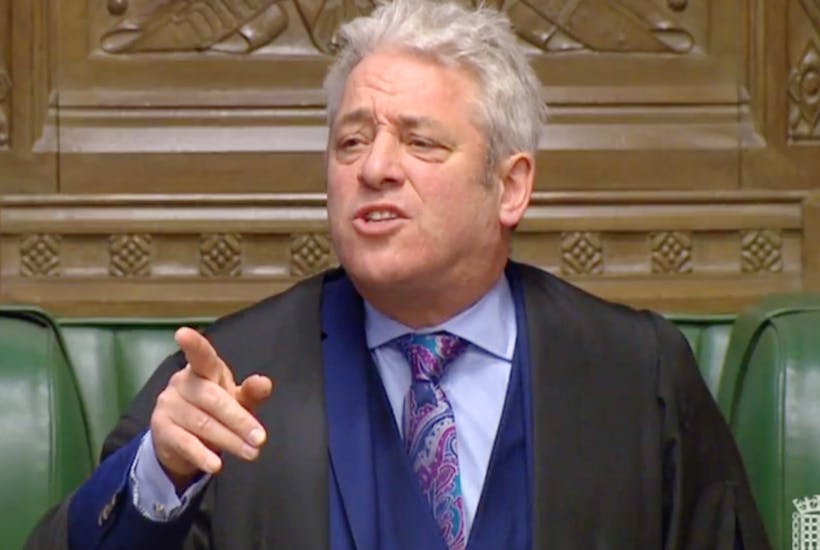Almost 400 years ago, in 1642, Speaker Lenthall famously declared ‘I have neither eyes to see nor tongue to speak in this place but as the House is pleased to direct me, whose servant I am here.’
That tradition died yesterday. Speaker Bercow took the powers of the House for himself, ruling that it could not make a decision about holding a third Meaningful Vote, and that he had instructed the Table Office not to accept such motions. This is extraordinary – while the Speaker has the power to rule motions and amendments in order, he has no power to prevent the tabling of them. Yet how can the parliamentary clerks refuse someone who is to all extents and purposes their boss?
His ruling had the effect of unusually uniting both defenders of the Government and defenders of the Commons yesterday. A respected former senior adviser who served in the Lib Dem Whips Office declared it ‘wrong’ and ‘procedurally incoherent’, an overextension of authority, and to the ‘potential long term detriments of Members’. While those at the Institute for Government argued that it is the Speaker’s ‘role to stand up for rights of Parliament not to prevent it deciding how to run itself’ and that the Government ‘ought to be allowed to test the will of the House on whether to set aside its own rule’, and that the Speaker was instructing clerks ‘not to do something that constitutionally they ought to do’.
It also exemplified the Speaker’s inconsistency: only two hours previously he had waived through a business motion which explicitly asserted that ‘notwithstanding the practice of the House, any motion on matters that have been the subject of a prior decision of the House in the current session may be the subject of a decision’. In effect, his judgement appears to be that if MPs are doing something he approves of they may bring such a motion, but the government may not.
We have gone from having a Speaker who uses procedural rules to benefit backbenchers and the opposition, to one that inconsistently waives or relies on precedent to back up his rulings, to one that has sought to create entirely new powers for himself. The veneer of impartiality has been lost.
And yet, despite all that, the Speaker sits God-like, protected by Remain MPs who value the advantages he bestows on them. Nothing can shift him so long as he has the support of a majority of MPs.
All is not lost for the Theresa May’s deal, the government can still secure a third meaningful vote, but they also need to overcome another obstacle: helping the Commons reassert its own power against the Speaker. This could be done using a motion that asserts the House’s right, in general, to decide and set aside its own rules, or it could go so far as to bring forward a motion regretting the Speaker’s ruling.
The conduct of the Speaker has been addressed on three occasions since the start of the 20th Century. The government could bring forward a motion similar to that in 1961 stating that the House ‘respectfully regrets and unhesitatingly dissents from the Ruling given by the Speaker’ and that his Ruling is ‘not in accordance with the precedents and practice of the House’. If that won a majority, the government could then bring forward the meaningful vote, but it may still need to seek the House’s agreement that ‘notwithstanding the convention of the House and the ruling of the Speaker’ the House would consider the deal again on a specific date.
Alternatively, the Government could introduce the Withdrawal Agreement Bill (WAB) early, with a clause that overrides the requirements of the EU Withdrawal Act for the Commons to approve the deal through a meaningful vote. Some worry that being confronted with the Bill itself, and the clauses – for example – enshrining the backstop, might be a step too far for MPs and spook those newly converted to the deal. However, the WAB needs to come forward promptly after the meaningful vote anyway, and that nettle will need to be grasped at some point.
Or, the nuclear option remains, the government could bring the current parliamentary session to an end and start anew with a fresh slate, and pose the question again. The Queen could even choose to use the Lords Commissioners in such a situation so her diary would not be an obstacle, and a short Queen’s Speech and short session could facilitate a speedy turnaround.
Finally, for completeness, and rather mischievously, I would note that if the Speaker is subject to an ‘unavoidable absence’, the Chairman of Ways and Means, Mr Hoyle is entitled to perform the duties and exercise the authority of the Speaker in relation to all proceedings of the House. In days gone by there were stories of MPs being trapped in the toilets to prevent them voting – let’s hope that no Whips are pushed to breaking point just yet.
Nikki da Costa is senior counsel at Cicero and former director of legislative Affairs at Number 10.






Comments